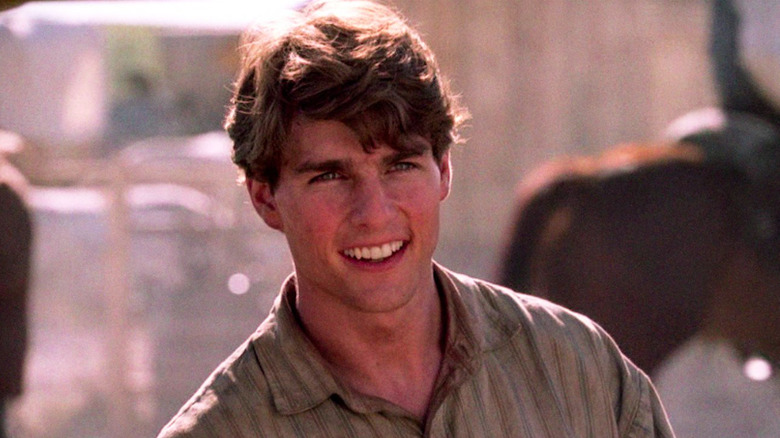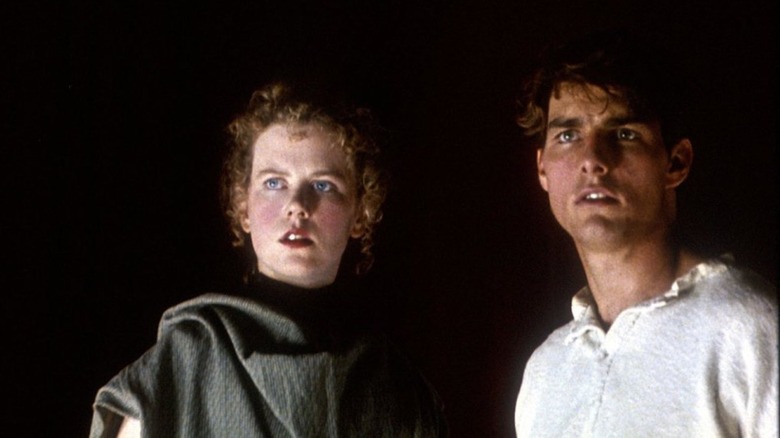Rotten Tomatoes Critics Are Split On Tom Cruise's Only Western Movie
We all know that Westerns are the most American of movie genres, one that many U.S.-born actors view as a proving ground of sorts. Strapping yourself with a couple of six-shooters and hopping astride a horse presents the opportunity to measure yourself against some of the greatest to ever do it: James Stewart, Henry Fonda, and John Wayne, to name just a legendary few. Oh, to stride down a dusty street at high noon, rope cattle at the ranch, or wallop someone you probably don't know over the back with a wooden chair in the midst of a saloon brawl — this is why we make and love movies.
For a guy who professes a deep and abiding love for classic films, Tom Cruise must've been champing at the bit to go into the West with Ron Howard in 1992's "Far and Away." Getting to make a Western wasn't the only appeal for Cruise; he'd also get to work again with his wife Nicole Kidman, whom he met and fell in love with two years prior to the shooting of Tony Scott's "Days of Thunder." Surely, this time out production would go more smoothly than it had on the chaotic stock car racing drama, which began principal photography late and had to be moved back from its Memorial Day berth to June 27 at great additional cost to Paramount. The film had a budget of $60 million and grossed $158 million worldwide — hardly what the studio had hoped for.
"Far and Away" was a steadier proposition. Though it also cost a reported $60 million, Howard and his producing partner Brian Grazer were not merchants of chest-puffing excess like Don Simpson and Jerry Bruckheimer. They had a screenplay they liked, and began shooting a full year before their 1992 Memorial Day berth. The movie about two rebellious Irish youngsters who flee to America to find a chunk of turf to call their own in an Oklahoma land run had an obvious "The Quiet Man" flourish to it (one of John Wayne's finest films according to /Film), as well as a widescreen 70mm breadth that brought to mind "The Big Country" and "Giant."
So why, 32 years after its theatrical release, is "Far and Away" far from beloved?
Cruise's Far and Away is an almost entirely credible triumph of filmmaking
"Far and Away" currently stands at a divided 50% "Rotten" on Rotten Tomatoes, though those numbers dip considerably if you narrow the aggregation to Top Critics. Only three of the listed 12 reviews, most of which are contemporaneous, tilt fresh — and those that do aren't exactly raves. Cruise and Kidman are "almost entirely credible" says The Washington Post's John F. Kelly! "Even at its hokiest, 'Far and Away' is never less than heartfelt," gushes Rolling Stone's Peter Travers. "Better than 'Days of Thunder,'" is the gist of Mark Dinning's write-up for Empire.
That's the way I remember it shaking out for "Far and Away" at the time. I remember taking a date to see it when it hit second-run theaters (surprisingly early) that summer, and we both had a watch-checking meh time. The major knock on the film from the nation's critics was best summarized by Roger Ebert, who called it "lavish" but "shallow." He's absolutely right. It feels like "The Quiet Man" dress–up at times, with noted mimic Cruise failing completely at his Irish accent. Mikael Saloman's cinematography is lush as hell, but the film is so vapid that his imagery can only keep you awake for so long.
To be fair, "Far and Away" does have a number of Rotten Tomatoes raves from reviewers who either revisited it recently or caught it for the first time. It's a terribly undemanding movie, so, in our age of distracted viewing, this isn't surprising. If you're looking for a background movie that looks and sounds like $60 million, you'll love intermittently watching "Far and Away!"

